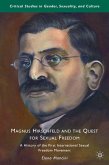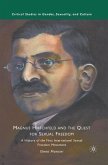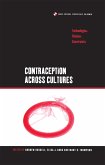Contraception is not an invention of modern times, nor is it a purely personal matter. Social institutions such as the church and the state have exerted their influence as effectively as doctors, population theorists, and the early pioneers of the feminist movement. All of these claim a special expertise in matters of ethics and morality, and so have shaped the discourses on and practices of birth control over the centuries. In this engaging new book Robert Jütte offers a history of contraception from the Ancient world to the present day. He distinguishes two broad phases: first, a long phase, extending from the Ancient world up to the 18th century, in which birth control was part of a traditional form of sexual knowledge what Jütte calls, following the French social philosopher Michel Foucault, the ars erotica. In the second phase, which began in the 19th century, practices of birth control are increasingly shaped by the emerging models of scientific knowledge, while still retaining some vestiges of the erotic arts. In addition to the contraceptives we know and use today, from coitus interruptus to the condom and the pill, Jütte considers other methods of birth control as diverse as the use of herbal potions and vaginal pessaries, the castration of young boys and the enforced sterilization of men and women. This comprehensive history of one of the oldest and most widespread of human practices offers a rich and nuanced account of how men and women across the centuries have struggled with the needs both for sexual gratification and for limitation of offspring, while also looking beyond the present to catch a glimpse of how contraception might evolve in the future.
"What sets Jütte's work apart and makes this volume essentialreading on the topic is its fine historiography and analysis offoregoing authors' projects."
The Lancet
"Should prove useful to students and scholars alike."
Times Higher Education
"A fascinating, detailed and well-researched insight into thesocial, cultural and religious influences that have influencedknowledge, attitudes, acceptance and use of fertility controlthroughout history."
Family Planning Association newsletter
"A carefully researched survey that will provide useful materialfor those interested in comparing ideas about contraception in different places and times."
English Historical Review
"Robert Jütte's extraordinary history ofcontraception enables us to look in an entirely new way at theclaim of the 1960s generation that theirs was the first sexualrevolution. The struggle for the control of sexual reproductionfrom the ancient world through the Middle Ages is as important toJütte's story as are the rise of sexual science in thenineteenth century and the introduction of the pill in thetwentieth. Indeed how 'modern' means exist side by side with'traditional' means of birth control (some more efficient thanothers - but which?) haunts this entire history. A readableand fascinating account of woman's age-old struggle."
Sander Gilman, Emory University
"The publication of an English version of Robert Jütte'sLust ohne Last is greatly to be applauded. This extremelythoughtful and engagingly written study substantially exceedsearlier attempts to set down histories of contraception. Jüttehas produced a chronologically wide-ranging cultural history andadopts a Foucauldian framework in which the issues of power andknowledge loom large throughout. As a result it is a work of greatinterest to social and cultural historians, demographers,historically minded social scientists, and historians of ideas,medicine and science."
Richard Smith, University of Cambridge
The Lancet
"Should prove useful to students and scholars alike."
Times Higher Education
"A fascinating, detailed and well-researched insight into thesocial, cultural and religious influences that have influencedknowledge, attitudes, acceptance and use of fertility controlthroughout history."
Family Planning Association newsletter
"A carefully researched survey that will provide useful materialfor those interested in comparing ideas about contraception in different places and times."
English Historical Review
"Robert Jütte's extraordinary history ofcontraception enables us to look in an entirely new way at theclaim of the 1960s generation that theirs was the first sexualrevolution. The struggle for the control of sexual reproductionfrom the ancient world through the Middle Ages is as important toJütte's story as are the rise of sexual science in thenineteenth century and the introduction of the pill in thetwentieth. Indeed how 'modern' means exist side by side with'traditional' means of birth control (some more efficient thanothers - but which?) haunts this entire history. A readableand fascinating account of woman's age-old struggle."
Sander Gilman, Emory University
"The publication of an English version of Robert Jütte'sLust ohne Last is greatly to be applauded. This extremelythoughtful and engagingly written study substantially exceedsearlier attempts to set down histories of contraception. Jüttehas produced a chronologically wide-ranging cultural history andadopts a Foucauldian framework in which the issues of power andknowledge loom large throughout. As a result it is a work of greatinterest to social and cultural historians, demographers,historically minded social scientists, and historians of ideas,medicine and science."
Richard Smith, University of Cambridge








